What you need to know about Legends of Runeterra's massive expansion, Rising Tides
120 new cards, a new region, six new ability keywords, and 11 new champions—this expansion is a big one.
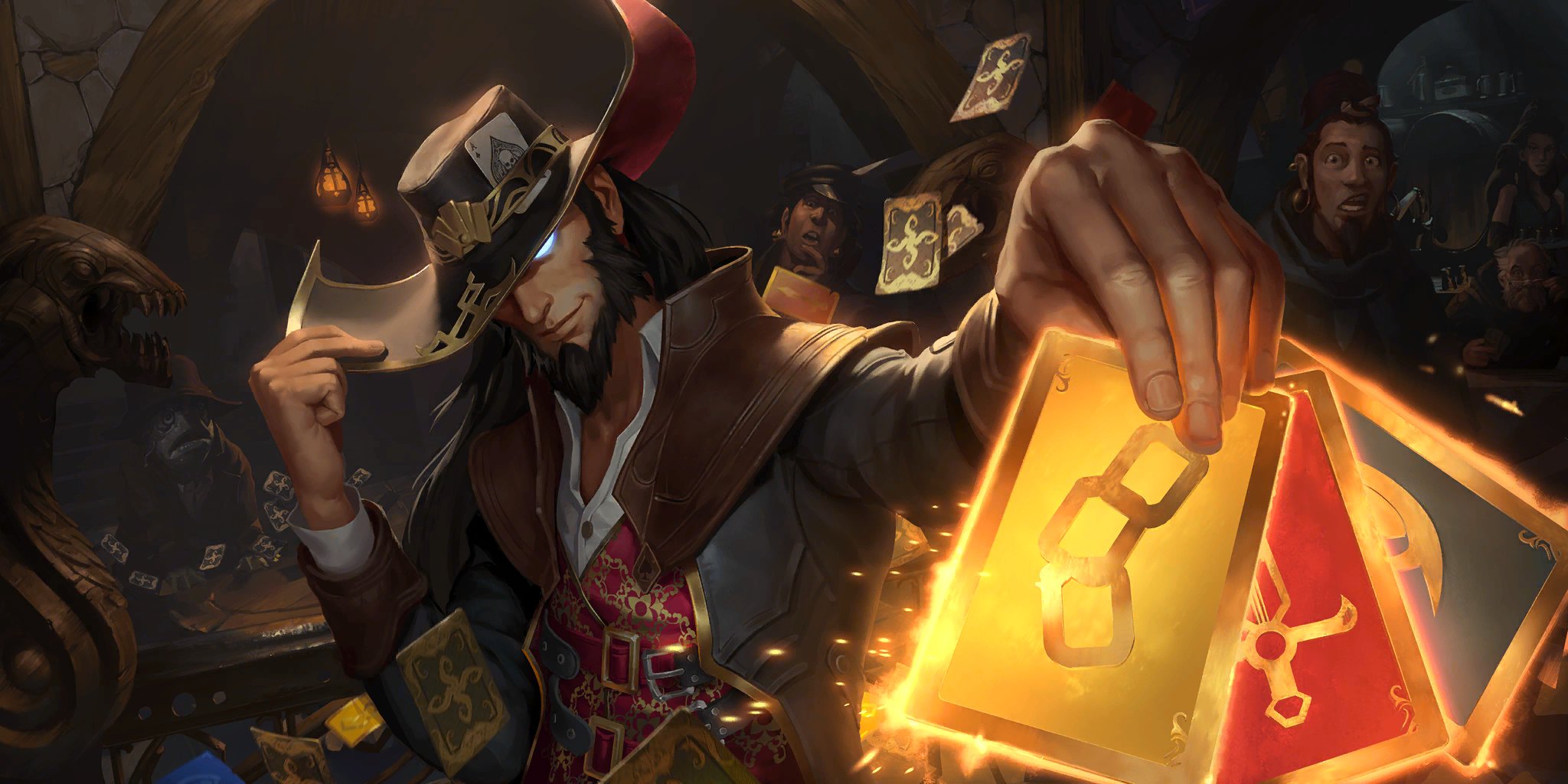
Legends of Runeterra, the surprisingly excellent League of Legends card game, is finally exiting open beta tomorrow. In addition to being available on both iOS and Android devices, Riot Games is also adding a whopping 120 new cards as part of its first expansion called Rising Tides. Sixty of those cards belong to an entirely new region called Bilgewater, a raucous and seedy pirate port, while the other 60 are spread between Runeterra's existing regions.
It's a big update, one that makes me optimistic that Legends of Runeterra won't be another card game that goes belly up within a year. To talk about Rising Tides, Bilgewater, and what's next, I sat down with executive producer Jeff Jew—but, first, let's take a look at Rising Tides.
Legends of Runeterra: Rising Tides
Rising Tides is the first real expansion to Legends of Runeterra and, like I said, includes 120 cards. The update will be available for PC players tomorrow, April 28. As you can probably guess, the expansion is themed around pirates and deep sea creatures, with six brand new keywords that introduce new abilities and playstyles, and 11 new champion cards—five of which are for Bilgewater and the rest spread between existing regions.
Because Rising Tides' new cards are spread across a variety of deck types, there's no one central gameplay concept it's built around. New keywords, like Deep, open up options for self-mill decks (where you intentionally discard your own cards), while Scout gives aggro and multi-hit decks even more ways to apply pressure.
You can check out the entire list of cards revealed so far over on the Legends of Runeterra subreddit.
The new Rising Tide keywords
- Attune: When I'm summoned, refill one spell mana.
- Scout: If you only attack with Scout units this turn, you get a second attack phase.
- Vulnerable: Apply this to enemies so you can drag them into combat against their will.
- Plunder: This ability is triggered each time you damage the enemy Nexus this round.
- Deep: These cards get +3/+3 if your deck has 15 or fewer cards left.
- Toss: Destroy X non-champion cards from the bottom of your deck.
The new Rising Tide champions
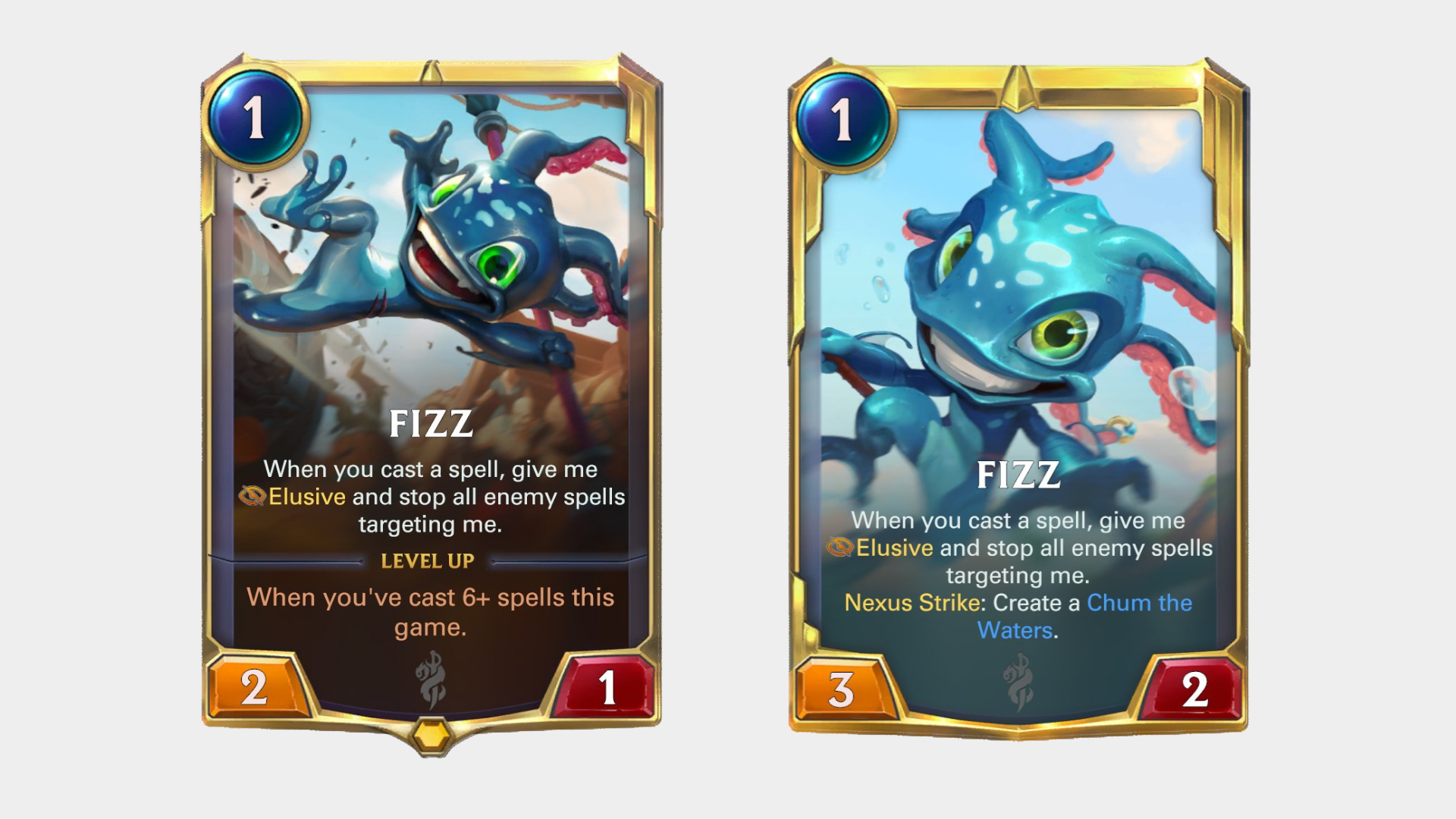
Fizz
Fizz (Bilgewater) is a slippery champion that gains Elusive when you cast spells, even if the spell is already targeting him. Casting six spells will level him up, giving him an extra ability to summon a powerful shark unit and apply Vulnerable to an enemy.
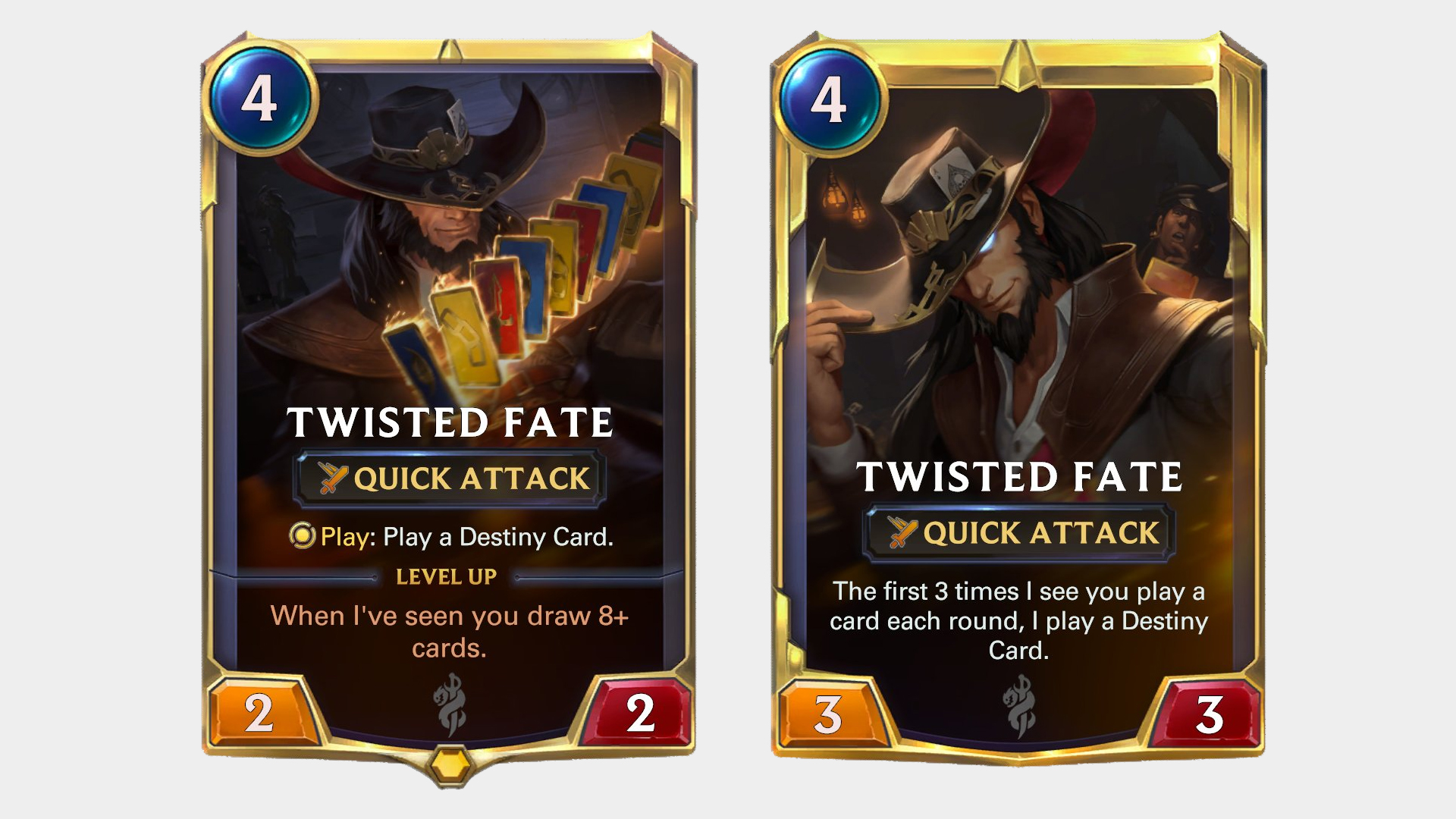
Twisted Fate
Twisted Fate (Bilgewater) gives you special Destiny cards that each have a different effect and cost nothing to cast. When he levels up, you'll start earning Destiny cards at a much higher rate, increasing your tempo significantly.
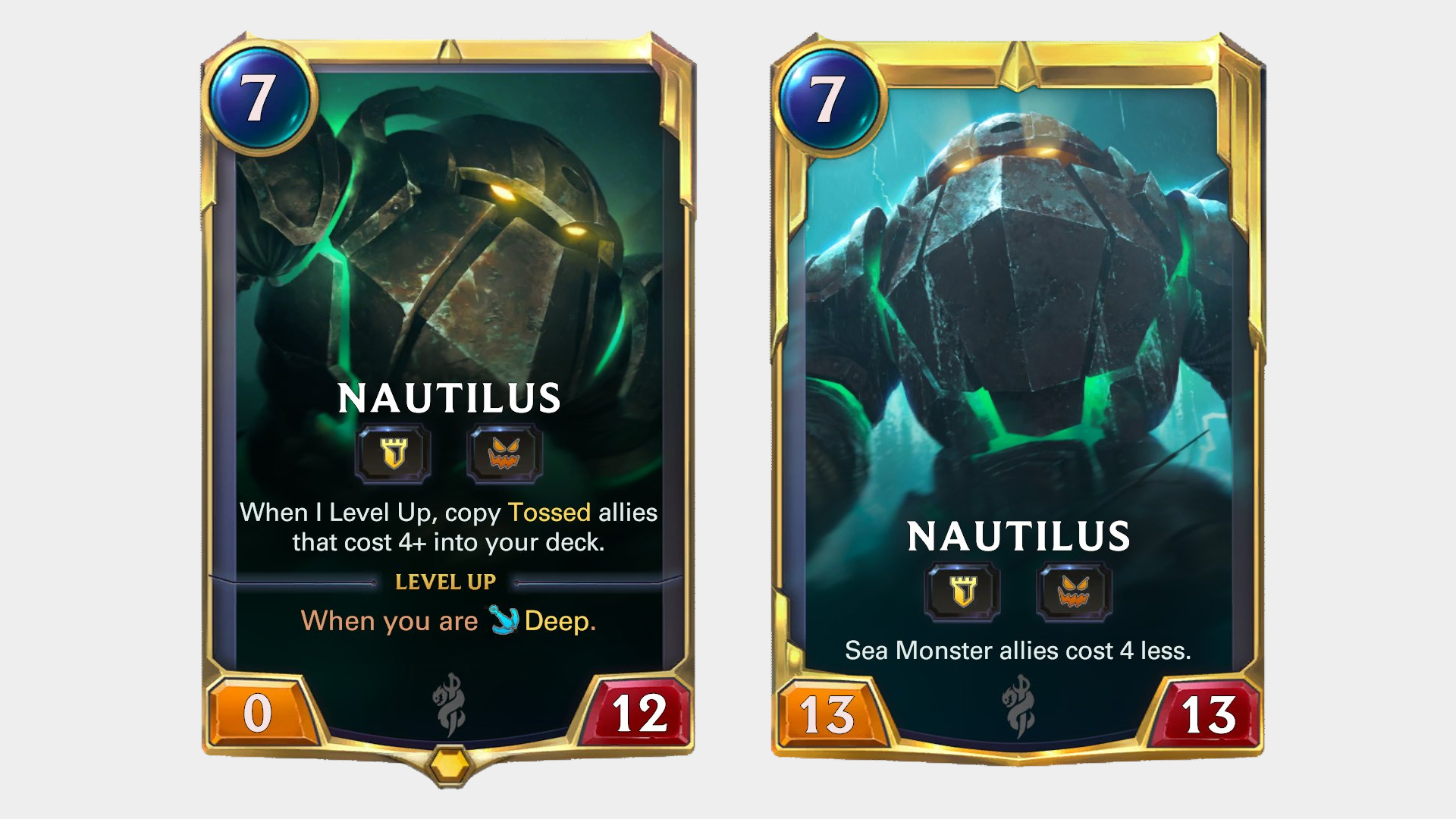
Nautilus
Nautilus (Bilgewater) is a wildly powerful card that copies any 4+ cost minions back into your deck when he levels up, which he only does after having fewer than 15 cards left in your deck. When he levels up, powerful Sea Monster-type cards are 4-mana cheaper.
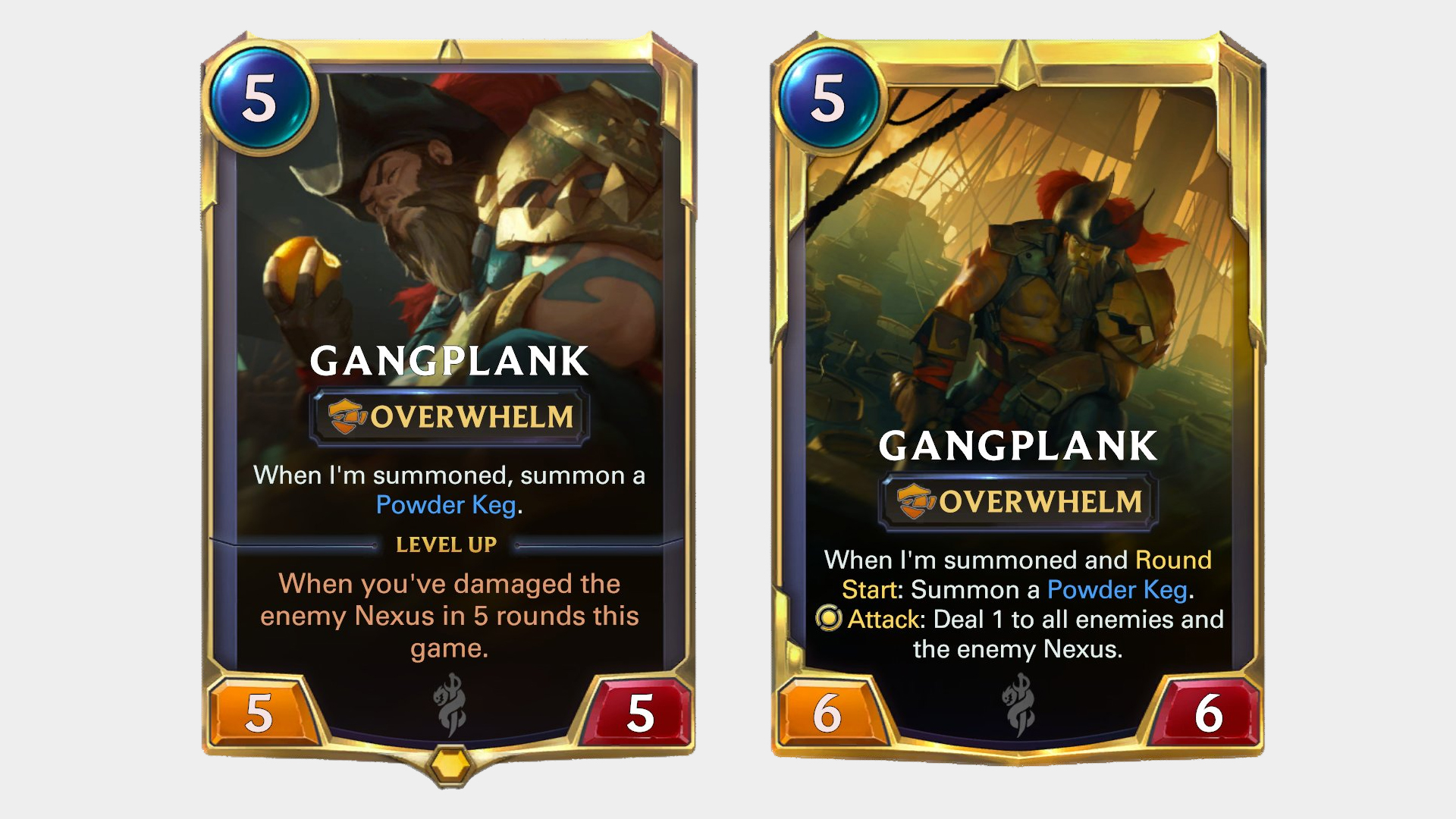
Gangplank
Gangplank (Bilgewater) summons Powder Kegs that increase spell damage but are destroyed each time you cast a spell, and when he levels up by damaging the Nexus five times, he starts dealing one damage to all enemies on each attack.
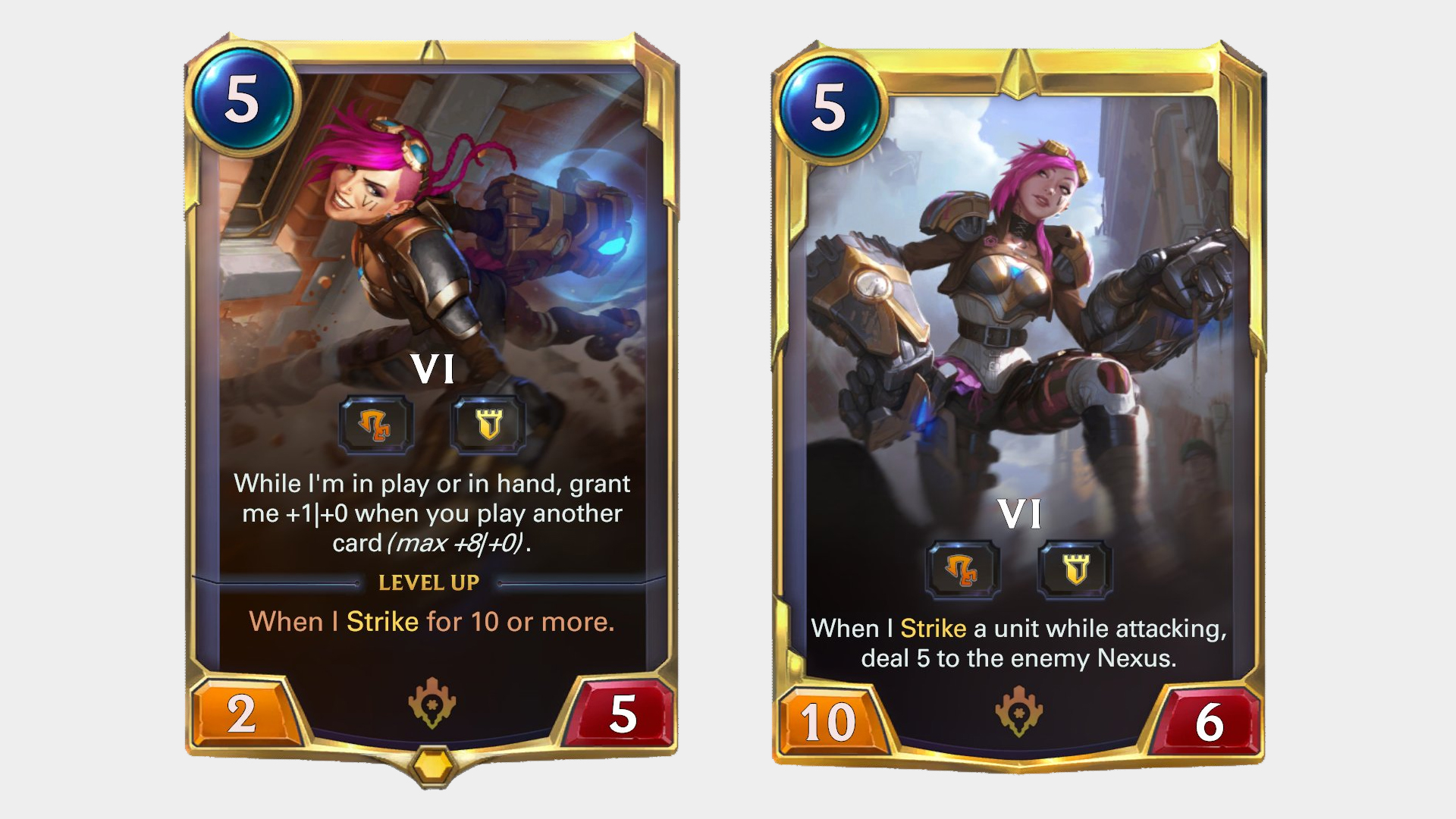
Vi
Vi (Piltover and Zaun) gains attack power each time you play another card. When she hits something with max attack, she'll level up and start doing bonus damage to the enemy Nexus on each attack.
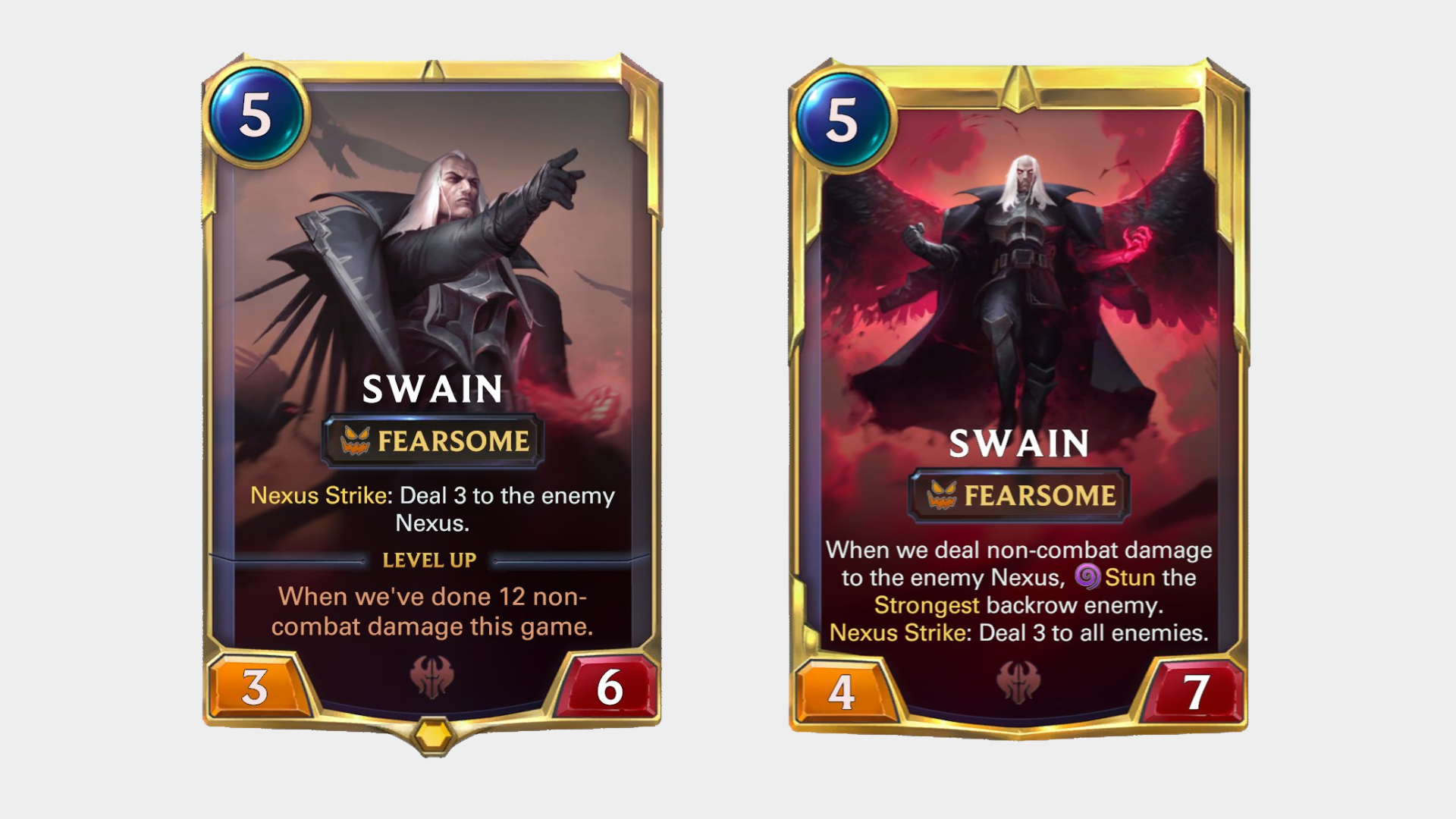
Swain
Swain (Noxus) does extra damage to the enemy Nexus when he hits it. If you trigger that effect, he'll level up so that each time he does extra damage to it, he'll stun the strongest enemy not in combat and deal three damage to all enemies.
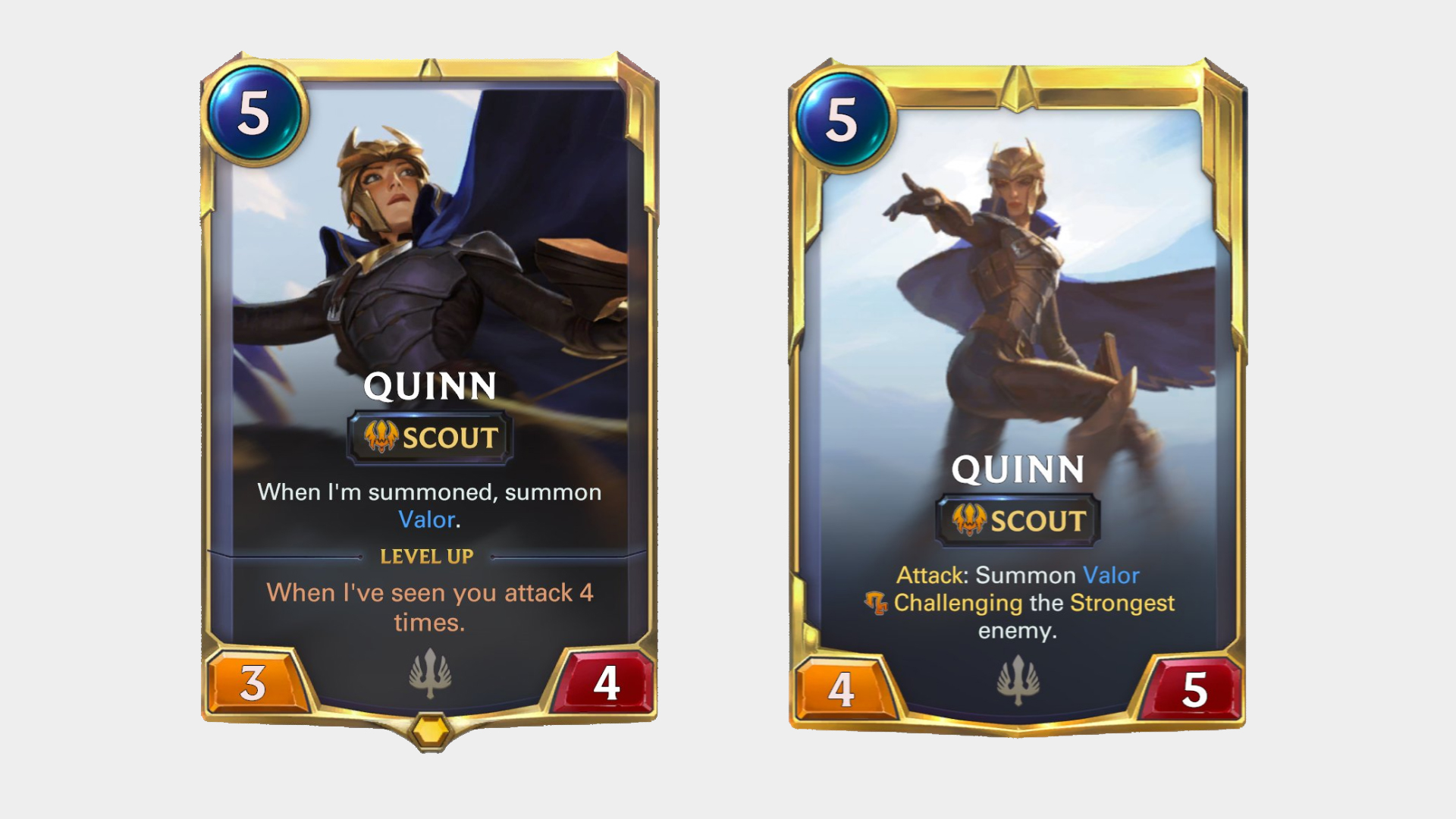
Quinn
Quinn (Demacia) is a strong skirmisher who summons a relatively weak pet falcon each time she attacks. Once she levels up, that falcon is summoned and automatically challenges the strongest enemy champion, providing a good distraction for Quinn to do even more damage.
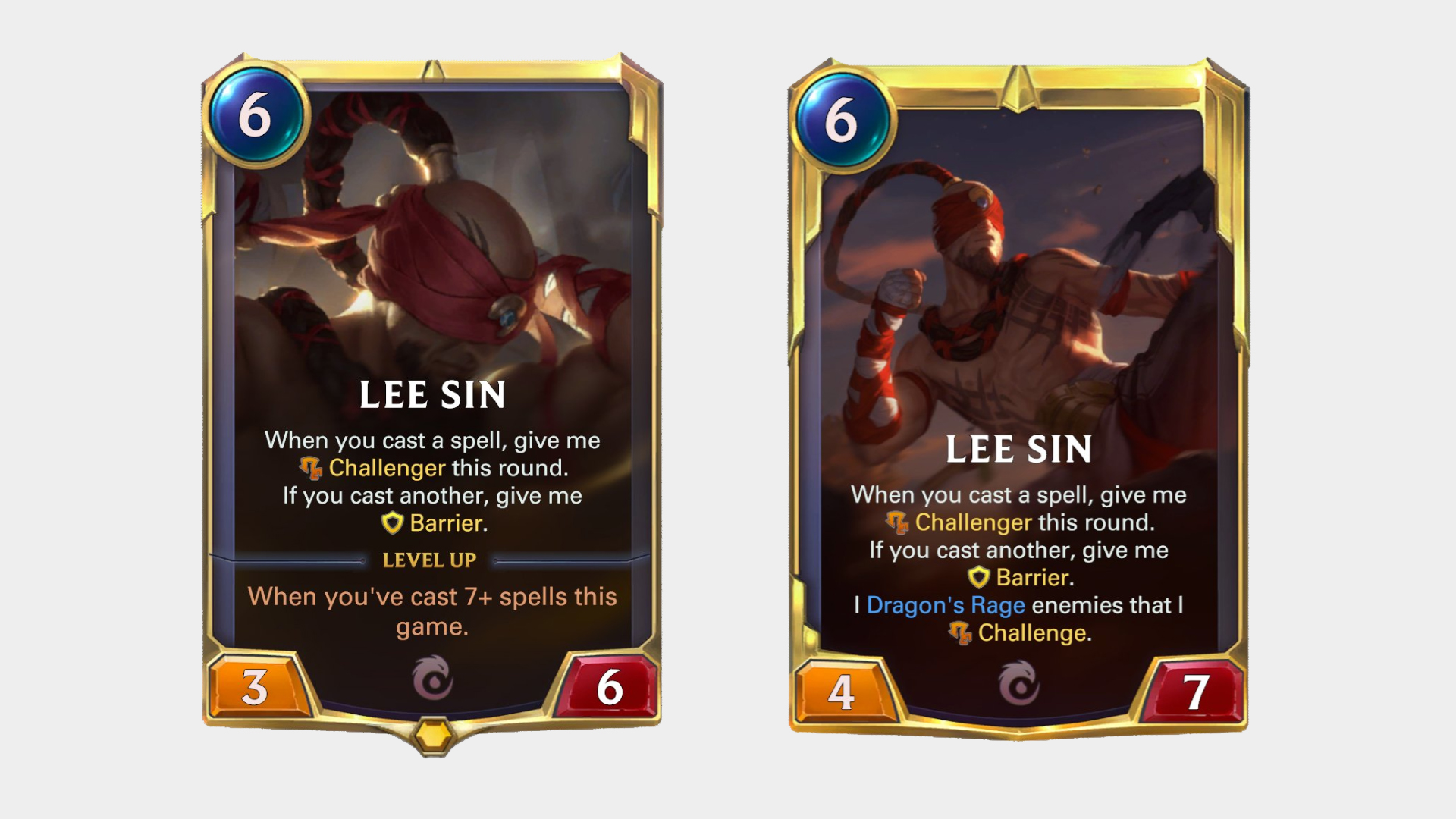
Lee Sin
Lee Sin (Ionia) gains Challenger and Barrier when you play two spells. When you've cast enough spells, he'll level up so that attacking a unit also damages the enemy Nexus at the same time. And if that unit survives, it'll be recalled to the enemy hand.
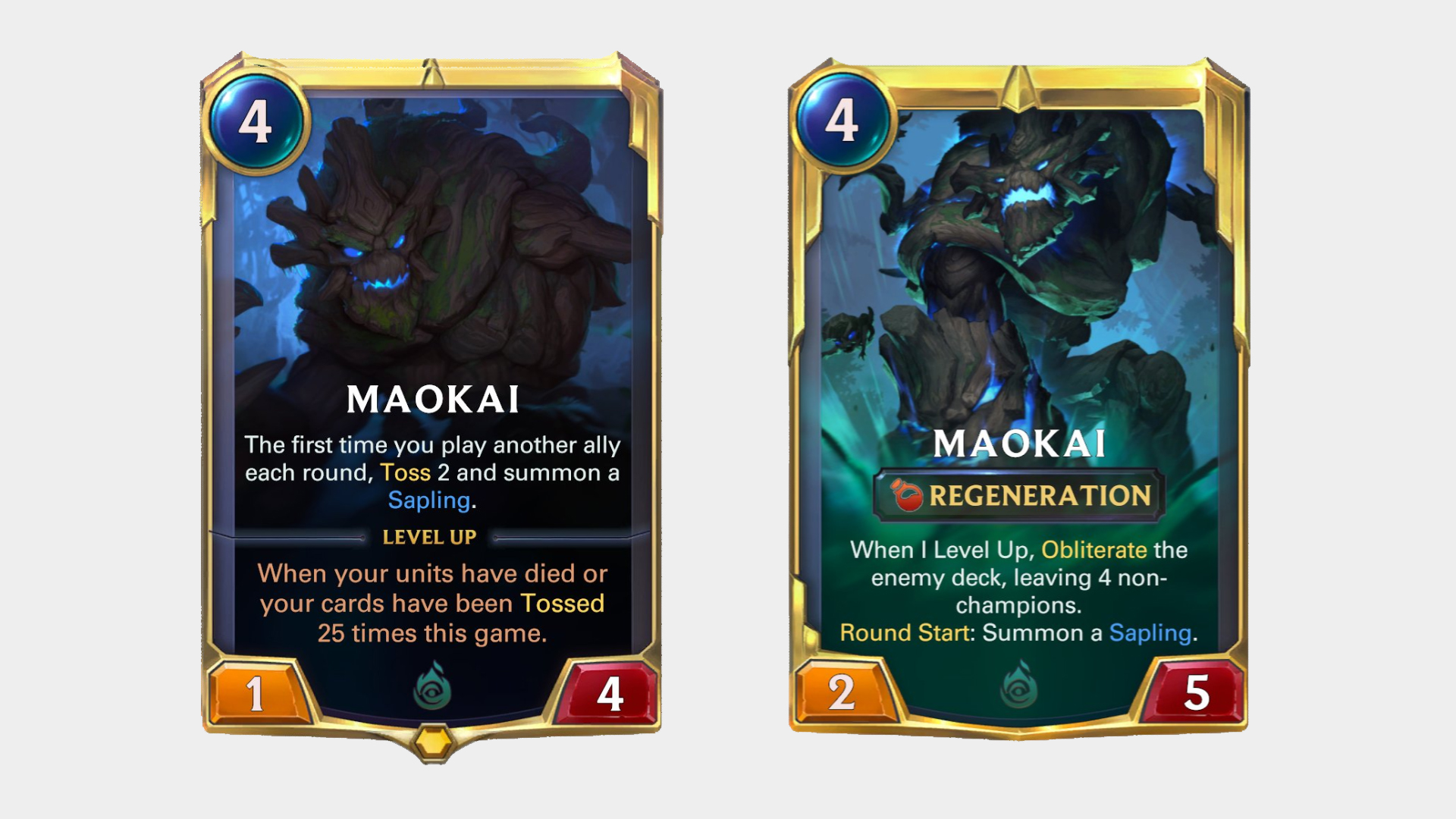
Maokai
Maokai (Shadow Isles) is a crazy all-or-nothing kind of card that destroys your own cards each time you play a unit. If you manage to trigger this effect enough times, he'll level up and destroy the enemy deck outright, leaving only four cards behind. But you'll be out of cards too.
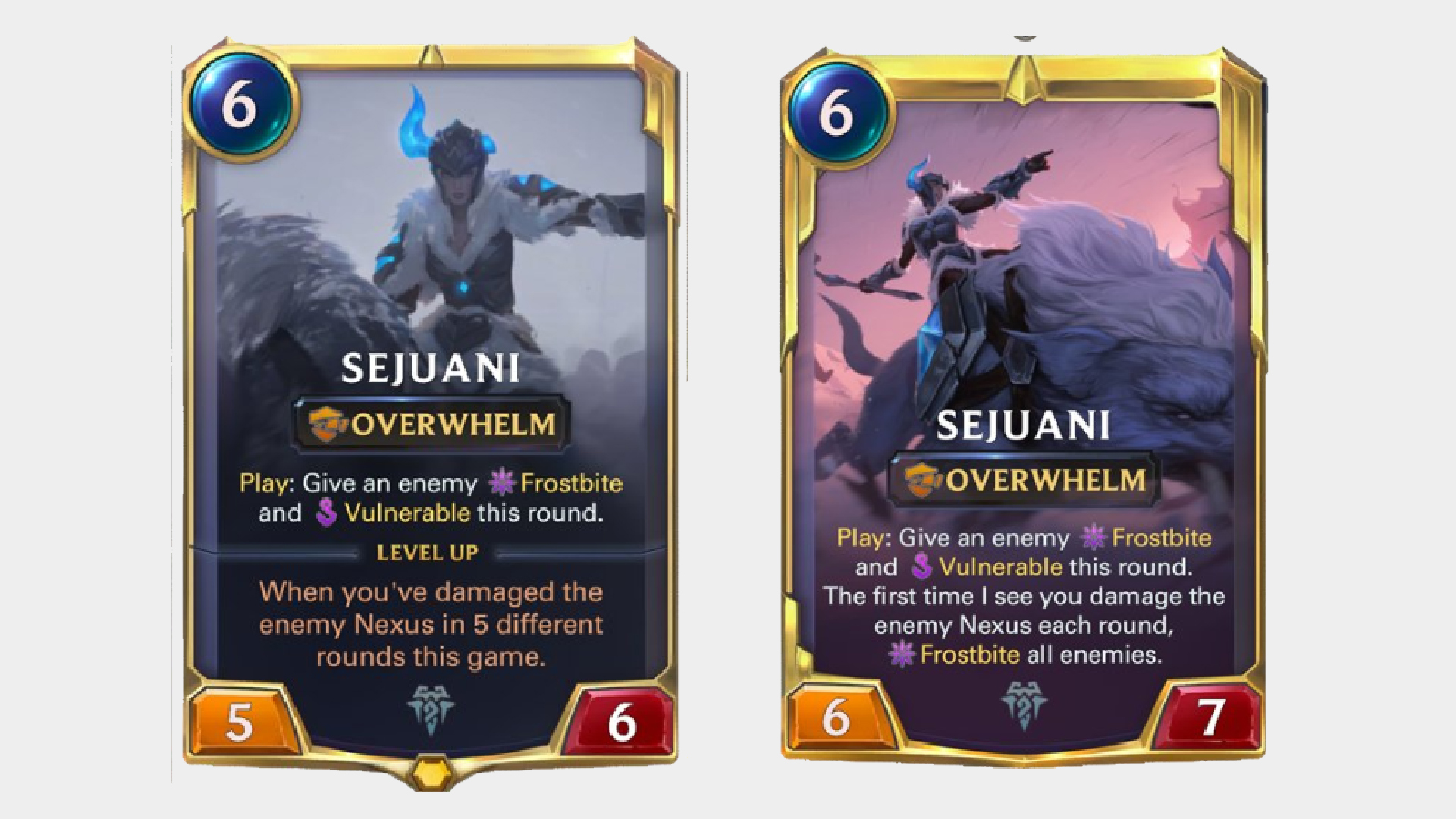
Sejuani
Sejuani (Freljord) is a powerful control champion that reduces an enemy's attack to zero and makes them Vulnerable. When she levels up and you damage the enemy Nexus, she'll Frostbite the entire enemy board.
What's next for Legends of Runeterra?
Ahead of the Rising Tides expansion launch, I spoke with executive producer Jeff Jew to talk about some of the most exciting parts about Rising Tides, and what the future of Runeterra is going to look like.
PC Gamer: Are big, 120-card expansions going to be the norm for Legends of Runeterra going forward? Is this how the game is going to expand over time?
The biggest gaming news, reviews and hardware deals
Keep up to date with the most important stories and the best deals, as picked by the PC Gamer team.
Jeff Jew, executive producer: It's interesting. I would say when we first started working on Legends of Runeterra, that was true. We thought we would only release sets in these big, mythic blocks of content because that's how the CCG genre has gone for so long. I think we're going to learn a lot from dropping 120 cards at the same time and seeing how players react. You know, there's a trade off. I think in the current model where we drop a big chunk, it means that you have a lot upfront. You have a lot to learn, you blow through it, and then once you collect it, you have to wait a few more months. I think we'll also experiment with other models like trailing content over time at a more consistent cadence. So this is kind of like an experiment for us. One thing we are committed to is expanding the number of regions players can play, and so I think that will definitely stay. But whether or not we continue to do the big chunks or a month to month cadence is still TBD.
What's interesting about Rising Tides is that half of the new cards are for existing regions. Are you at all worried about diluting what makes those decks unique by adding more tools to them?
We've established some light archetypes in the foundation set, but for each of these new regions in the new expansion, there's new keywords. For example, for Demacia, players will play Quinn and Quinn has a variation of the Rally mechanic called Scout. Rally, which is being able to attack twice inside of one turn, was a kind of a value that Demacia already had through Lucian. But by adding Quinn and getting a new type of units—followers that have the Scout keyword—those Scout units can attack by themselves, which then resets your attack token and then you can attack again, potentially you can even Rally. They're like subtle variations on the values that the regions already have that will even more play into their cool playstyles. I don't think we're even close to running out yet. We'll see once you know, you have all these reasons to flesh out Yeah, there's just, there's just so much to do.
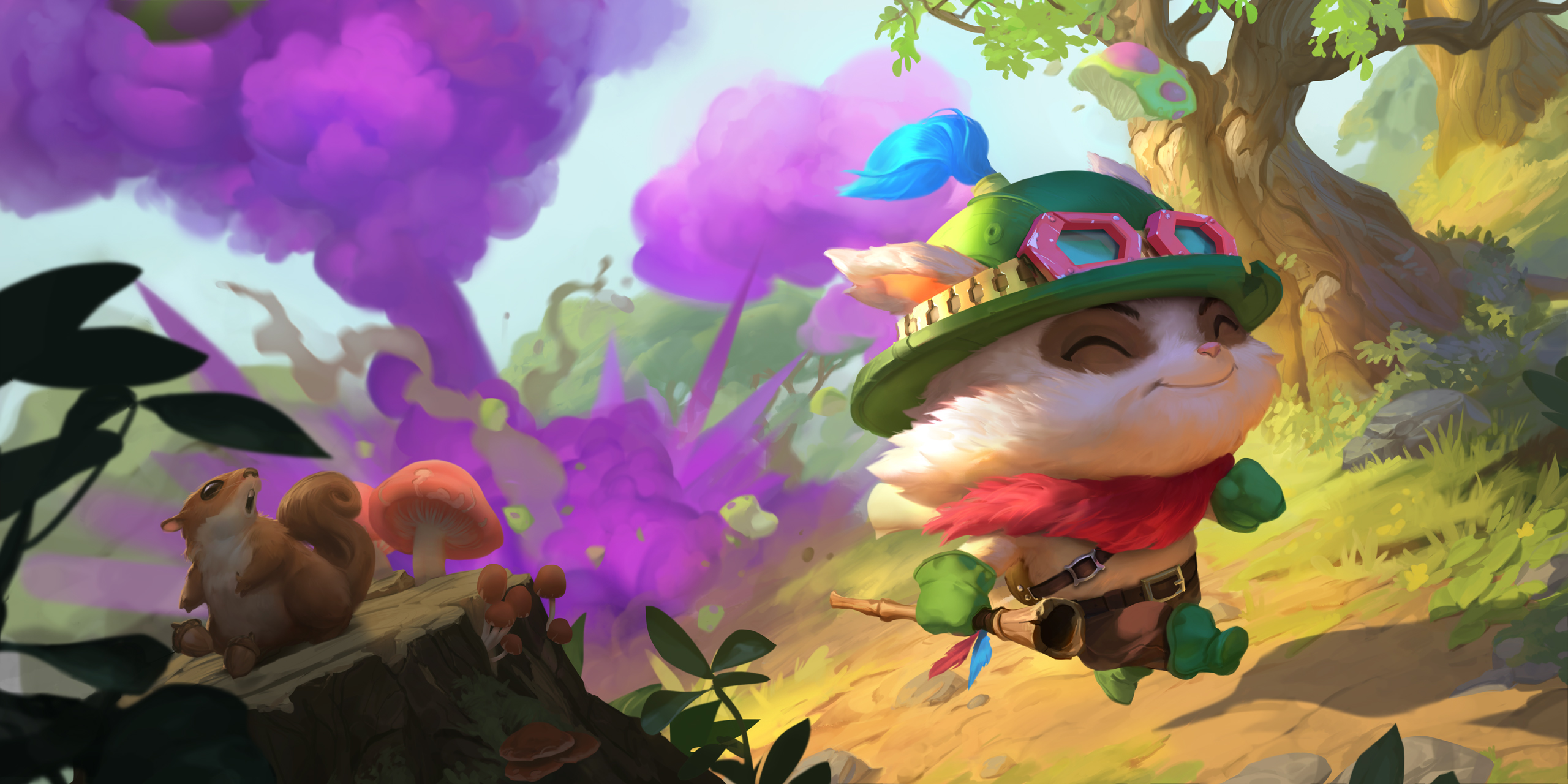
Right now we're working on some new game modes, which I think will be really fun.
Jeff Jew, executive producer
Back when we spoke a few months ago, you said one of your goals was to have 10 different decks that were equally competitive in Runeterra's ranked mode. Now that we're nearing the end of the first Ranked season, how did that pan out?
I'm really happy with the meta, but I still think there's work to be done. I would say if I had to guess, it's probably like seven-ish [competitive decks] right now, which is still pretty pretty good. Through the balance changes we made over time, which folks saw with changes to the Elusive decks we did, we did have some deck archetypes that were a little bit too powerful, that kind of edged other ones out. But we've been seeing some really, really wild and interesting decks being played right now, like a no champions deck. I think that aspirational goal is definitely within grasp. And with Rising tides come out, gosh, I mean, with those 11 champions across all the regions, it just opens up so many more play patterns. I'm going to guess in the opening weeks of Rising Tides' launch, we're going to see a really wild amount of decks, you know, in that top tier, which usually then settles over the course of the first few weeks. That's when our balance changes will come into effect. So I think we do have work, but I've been really, really happy around the diversity.
Speaking of competition, how are you going to address the inevitable power creep of adding more and more cards over time? Are you going to eventually limit Ranked mode to only a set number of cards versus letting people play with everything?
One thing we committed to is we wouldn't rotate any sets for at least a year-plus. We really want to flesh out all the regions before we even talk about any kind of rotation. But rotation will happen at some point. We don't want to have a game where players have to come in and learn 2,000 cards at the same time, but we're really committed to making the all cards format competitive as well. And then in terms of competitive [modes], we've actually been playtesting our potential competitive format internally. We're experimenting with a lot of different things like bringing X number of decks and being only able to use one at a time, or picks and bans. We're trying to strike the right chord between players being able to play the deck, or the regions, that they've been practicing for and also making sure there's variation, so not everyone's just playing the same few best decks, if you will.
That sounds pretty cool. Can you talk about what else is on the roadmap that players can look forward to after Rising Tides?
Right now we're working on some new game modes, which I think will be really fun. We're working on some kind of mutators—better ways to use the cards you've invested in and collected. One of our core tenants for building these game modes is that they really draw on your collection, because we really want to make sure that players feel like their time has been well spent. And then we're also going to focus on competitive play and building up a rich format that makes sense to all players, and they can practice for potentially moving into real events later on. So we're actually doing some deep dives internally on our post launch roadmap right now. But in the coming months, we'll be able to chat with you about what that actually is gonna look like.
With over 7 years of experience with in-depth feature reporting, Steven's mission is to chronicle the fascinating ways that games intersect our lives. Whether it's colossal in-game wars in an MMO, or long-haul truckers who turn to games to protect them from the loneliness of the open road, Steven tries to unearth PC gaming's greatest untold stories. His love of PC gaming started extremely early. Without money to spend, he spent an entire day watching the progress bar on a 25mb download of the Heroes of Might and Magic 2 demo that he then played for at least a hundred hours. It was a good demo.


